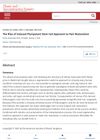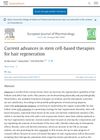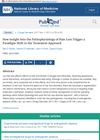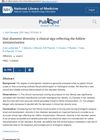Regenerative Medicine Strategies for Hair Growth and Regeneration: A Narrative Review of Literature
December 2022
in “Regenerative Therapy”

TLDR New regenerative treatments for hair loss show promise but need more research for confirmation.
The document reviews regenerative medicine strategies for treating alopecia, focusing on mesenchymal stem cell (MSC) implantation, MSC-derived secretome treatment, and platelet-rich plasma therapies. Conventional treatments like corticosteroids, minoxidil, and 5α-reductase inhibitors have significant side effects and limited efficacy, necessitating novel therapies. MSCs suppress inflammation and modulate immune responses, beneficial for conditions like alopecia. Adipose-derived MSCs (AD-MSCs) have shown promising results, increasing hair diameter and density in 19 out of 20 patients within 3-6 months of treatment. Other cell types like bone marrow-derived MSCs (BM-MSCs), human umbilical cord blood-derived MSCs (hUCB-MSCs), human dermal papilla cells (hDPCs), and human induced pluripotent stem cells (hiPSCs) have also shown potential. Cell-free therapies, including MSC-derived extracellular vesicles (EVs) and exosomes, are being explored for hair growth and regeneration. Despite promising results, larger, more controlled clinical trials with standardized protocols are needed.
View this study on sciencedirect.com →
Cited in this study

research Current Application of Mesotherapy in Pattern Hair Loss: A Systematic Review
Mesotherapy might help with hair loss but more research is needed.

research Platelet‐rich plasma in hair loss—Mechanism, preparation, and classification
Platelet-rich plasma may help with hair loss by promoting hair growth.

research The Rise of Induced Pluripotent Stem Cell Approach to Hair Restoration
Using special stem cells, we can create new hair follicles, potentially making hair restoration easier and more affordable.

research Safety of low-dose oral minoxidil for hair loss: A multicenter study of 1404 patients
Low-dose oral minoxidil safely treats hair loss, with hypertrichosis as main side effect.

research Topical Treatment for Scarring and Non-Scarring Alopecia: An Overview of the Current Evidence
Minoxidil and finasteride are the best for non-scarring hair loss; more research is needed for scarring hair loss treatments.

research Age-Related Changes in Female Scalp Dermal Sheath and Dermal Fibroblasts: How the Hair Follicle Environment Impacts Hair Aging
Aging causes changes in the scalp that can affect hair growth and lead to older-looking hair in women.

research Oral minoxidil treatment for hair loss: A review of efficacy and safety
Oral minoxidil promotes hair growth but may cause side effects; needs monitoring.

research Functional hair follicle regeneration: an updated review
Hair follicle regeneration possible, more research needed.

research Current advances in stem cell-based therapies for hair regeneration
Stem cell therapies show promise for hair regrowth but face production and application challenges.

research Autologous cell–based therapy for male and female pattern hair loss using dermal sheath cup cells: A randomized placebo-controlled double-blinded dose-finding clinical study
DSC cell injections significantly improved hair density and diameter, showing potential as a hair loss treatment.

research Sequential Scalp Assessment in Hair Regeneration Therapy Using an Adipose-Derived Stem Cell–Conditioned Medium
Using a special stem cell formula on the scalp once a month for six months helped people with hair loss grow more hair.

research Telogen Effluvium: A Review of the Literature
The conclusion is that treatments for Telogen Effluvium exist, but standard treatment guidelines are needed.

research Cell Enriched Autologous Fat Grafts to Follicular Niche Improves Hair Regrowth in Early Androgenetic Alopecia
Adding cells to fat grafts improves hair regrowth in early baldness, but effects lessen over time.

research Stromal vascular fraction‐enriched platelet‐rich plasma therapy reverses the effects of androgenetic alopecia
SVF-PRP therapy effectively reverses hair loss effects.

research Systematic Review of Platelet-Rich Plasma Use in Androgenetic Alopecia Compared with Minoxidil®, Finasteride®, and Adult Stem Cell-Based Therapy
PRP injections may be a safe, effective alternative for hair loss treatment compared to minoxidil and finasteride.

research Macrophage-Derived Extracellular Vesicle Promotes Hair Growth
Special cell particles from macrophages can help hair grow.

research The impact of oxidative stress in the androgenic alopecia in women
Oxidative stress plays a role in female pattern baldness, causing an imbalance between harmful and protective elements in the body.

research Harnessing the Power of Regenerative Therapy for Vitiligo and Alopecia Areata
Regenerative therapies show promise for treating vitiligo and alopecia areata.

research Maintaining Hair Inductivity in Human Dermal Papilla Cells: A Review of Effective Methods
The review concluded that keeping the hair-growing ability of human dermal papilla cells is key for hair development and growth.

research Advances in Stem Cell-Based Therapy for Hair Loss.
Stem cell therapies show promise for treating hair loss, but more research is needed to understand their safety and effectiveness.

research Physiopathology and current treatments of androgenetic alopecia: Going beyond androgens and anti‐androgens
Hair loss treatments work better with lifestyle changes.

research Advances in Regenerative Stem Cell Therapy in Androgenic Alopecia and Hair Loss: Wnt Pathway, Growth-Factor, and Mesenchymal Stem Cell Signaling Impact Analysis on Cell Growth and Hair Follicle Development
Stem cell therapy, particularly using certain types of cells, shows promise for treating hair loss by stimulating hair growth and development, but more extensive trials are needed to confirm these findings.

research Platelet-Rich Plasma and Micrografts Enriched with Autologous Human Follicle Mesenchymal Stem Cells Improve Hair Re-Growth in Androgenetic Alopecia. Biomolecular Pathway Analysis and Clinical Evaluation
PRP and HF-MSCs treatment improves hair growth, thickness, and density in androgenetic alopecia.

research Use of human intra-tissue stem/progenitor cells and induced pluripotent stem cells for hair follicle regeneration.
Stem cells can help regenerate hair follicles.

research Complementary and Alternative Treatments for Alopecia: A Comprehensive Review
Some alternative treatments for hair loss might work, but more research is needed.

research Efficacy of non-surgical treatments for androgenetic alopecia: a systematic review and network meta-analysis
Low level laser therapy works best for hair loss, followed by PRP, finasteride, and minoxidil.

research Introducing Platelet-Rich Stroma: Platelet-Rich Plasma (PRP) and Stromal Vascular Fraction (SVF) Combined for the Treatment of Androgenetic Alopecia
New treatment combining PRP and SVF increases hair density in 6-12 weeks for androgenetic alopecia patients.

research Regulation of hair follicle development by exosomes derived from dermal papilla cells
Exosomes from dermal papilla cells can help grow hair and might treat hair loss.

research Traction alopecia: the root of the problem
Tight hairstyles and chemical relaxers can cause hair loss known as traction alopecia.

research Stem cell therapy as a novel therapeutic intervention for resistant cases of alopecia areata and androgenetic alopecia
Stem cell therapy may help treat tough hair loss cases.

research Evidence-based (S3) guideline for the treatment of androgenetic alopecia in women and in men – short version
Use minoxidil for hair loss treatment; assess results after 6 months.

research Human umbilical cord blood mesenchymal stem cells engineered to overexpress growth factors accelerate outcomes in hair growth
Modified stem cells from umbilical cord blood can make hair grow faster.

research New Insight Into the Pathophysiology of Hair Loss Trigger a Paradigm Shift in the Treatment Approach.
New research suggests treating hair loss should focus on common inflammation rather than individual molecules.

research Hair Regeneration Therapy: Application of Adipose-Derived Stem Cells
Using fat-derived stem cells for hair loss treatment is safe and effective, improving hair growth and patient satisfaction.

research Platelet-rich plasma for androgenetic alopecia: Does it work? Evidence from meta analysis
PRP treatment may increase hair density and reduce hair loss, but more research is needed.

research Alopecia Areata: a Comprehensive Review of Pathogenesis and Management
New treatments for Alopecia Areata show promise but need to be more effective and affordable.

research Experimental and early investigational drugs for androgenetic alopecia
New hair loss treatments may include topical medications, injections, and improved transplant methods.

research Hair follicle growth by stromal vascular fraction-enhanced adipose transplantation in baldness
SVF-enhanced adipose transplantation shows potential as a hair loss treatment.

research The effectiveness of treatments for androgenetic alopecia: A systematic review and meta-analysis
Minoxidil, finasteride, and low-level laser light therapy effectively treat hair loss.

research Evaluation of Not-Activated and Activated PRP in Hair Loss Treatment: Role of Growth Factor and Cytokine Concentrations Obtained by Different Collection Systems
PRP treatment improves hair growth, and the device used can affect results, with some being more effective.

research Platelets rich plasma versus minoxidil 5% in treatment of alopecia areata: A trichoscopic evaluation
PRP more effective than minoxidil 5% for treating alopecia areata.

research The Use of Adipose-Derived Stem Cells in Selected Skin Diseases (Vitiligo, Alopecia, and Nonhealing Wounds)
Adipose-derived stem cells show promise in treating skin conditions like vitiligo, alopecia, and nonhealing wounds.

research Guidelines on the use of finasteride in androgenetic alopecia
Taking 1 mg of finasteride daily can increase hair count and improve hair appearance, but it may have side effects on sexual function and a potential risk of prostate cancer. It may not be effective for postmenopausal women unless taken in higher doses.

research The Effect of Platelet-Rich Plasma in Hair Regrowth: A Randomized Placebo-Controlled Trial
Platelet-rich plasma injections significantly improved hair regrowth and thickness in patients with hair loss.

research Successful treatment of corticosteroid-resistant ophiasis-type alopecia areata (AA) with platelet-rich plasma (PRP)
Platelet-rich plasma (PRP) injections successfully treated a woman's steroid-resistant hair loss, causing hair to regrow within a month.

research Clinical use of conditioned media of adipose tissue-derived stem cells in female pattern hair loss: a retrospective case series study
ADSC-CM treatment improved hair density and thickness in women with hair loss, safely and effectively.

research Primary Scarring Alopecias
The document concludes that primary scarring alopecias cause permanent hair loss, have unpredictable outcomes, and lack definitive treatments, requiring personalized care.
research Investigation of oxidative stress in patients with alopecia areata and its relationship with disease severity, duration, recurrence and pattern

research Therapeutic strategy for hair regeneration: hair cycle activation, niche environment modulation, wound-induced follicle neogenesis, and stem cell engineering
The conclusion is that hair growth can be improved by activating hair cycles, changing the surrounding environment, healing wounds to create new hair follicles, and using stem cell technology.

research Alopecia areata: An update
The document concludes that alopecia areata is an autoimmune disease without a definitive cure, but treatments like corticosteroids are commonly used.

research The Latest Advance in Hair Regeneration Therapy Using Proteins Secreted by Adipose-Derived Stem Cells
Proteins from stem cells improved hair growth in patients with hair loss.

research Autologous Platelet-Rich Plasma: A Potential Therapeutic Tool for Promoting Hair Growth
Platelet-rich plasma can potentially promote hair growth by stimulating cell growth and increasing certain proteins.

research Minoxidil Use in Dermatology, Side Effects and Recent Patents
Minoxidil treats hair loss, promotes growth, has side effects, and has recent patents.

research Primary cicatricial alopecia: Recent advances in understanding and management
New understanding of the causes of primary cicatricial alopecia has led to better diagnosis and potential new treatments.

research Involvement of scalp and nails in lupus erythematosus
Lupus can affect the scalp and nails, often causing hair loss and nail damage, and needs early aggressive treatment to prevent permanent damage.

research Diagnosing and treating hair loss.
The review suggests seeing a dermatologist for scarring hair loss and using treatments like minoxidil or finasteride for common male and female pattern hair loss.

research The role of scalp dermoscopy in the diagnosis of alopecia areata incognita
Scalp dermoscopy is good for diagnosing a type of hair loss and helps choose the best spots for biopsy.

research The hair cycle
The document concludes that the hair cycle is a complex process involving growth, regression, and rest phases, regulated by various molecular signals.

research Hair diameter diversity: a clinical sign reflecting the follicle miniaturization.
Different thicknesses of hair strands can indicate the severity of hair thinning.
Related

research Regenerative Medicine Strategies for Hair Growth and Regeneration: A Narrative Review of Literature
New regenerative treatments for hair loss show promise but need more research for confirmation.